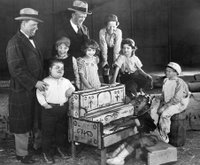Uncle Bob

Film director Robert McGowan, the trusty helmsman of the earliest and the best of the "Our Gang" comedies, was born on this day in 1882 in Denver, Colorado.
A Colorado fireman who suffered a career-ending injury, McGowan was a naturally gifted storyteller, arriving in Hollywood in 1913 hoping to break into movie production. He eventually caught on as a gag writer for silent comedies at Hal Roach Studios. When Hal Roach came up with the idea for a series of kid comedies in 1922, he turned the reins over to McGowan. Like a benevolent, respected old uncle, McGowan charmed wonderfully natural comic performances out of such children as Mickey Daniels, Mary Kornman and Farina Hoskins for the gleeful "Our Gang" short comedies during the silent period, always attempting to make sure that the children enjoyed what they were doing, filming them outdoors in an atmosphere of play.
By the time sound film came into vogue, McGowan had already made 68 silent "Our Gang" comedies and had nearly retired; but sound and new cast members (eventually including Jackie Cooper, Stymie Beard and Spanky McFarland) gave McGowan new energy, leading him to make some of the most entertaining entries in the "Our Gang" catalog from the advent of sound until he finally did retire in 1933. (His nephew, Anthony Mack, continued making the films from time to time along with other directors until the end of the series, sometimes under the name of "Robert A. McGowan" -- which is a shame because Mack wasn't nearly as talented as his uncle.)
What is also remarkable about his early sound films is their urban realism: in Pups is Pups (1930) for example, most of the action takes place within the confines of a smoky factory ghetto, shown in long shot at the beginning of the movie, his street urchins all coming from disadvantaged homes, with black children always mixing on friendly terms with white children -- because poverty, of course, loves company. His deft use of cross-cutting, outdoor locations, and a combination of slapstick with poignant scenes took away some of the stiffness which marked much of early sound film production.
Later he wrote gags at Paramount and directed a few comedies elsewhere, occasionally enjoying a round of golf with such friends as W.C. Fields or Oliver Hardy. He died on January 27, 1955 in Santa Monica, California.
Labels: Classic Cinema, Silent Film





0 Comments:
Post a Comment
Subscribe to Post Comments [Atom]
<< Home